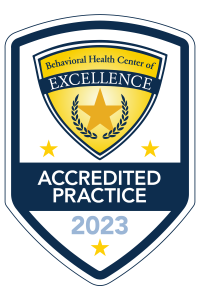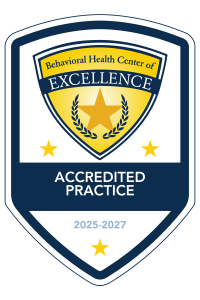Do you have questions? We have answers!
Frequently Asked Questions
Online information about Applied Behavior Analysis (ABA) and ABA Therapy is confusing. Our list of frequently asked questions (FAQs) answers the most common questions we hear from parents and caregivers. We hope it helps!
Have further questions? Don’t hesitate to reach out to our Care Team today!
Questions About ABA Therapy
Studies show ABA therapy provided in a structured learning environment leads to higher rates of learning. This is why InBloom Autism Services initially provides most direct services in our learning centers. To ensure skills and desired behavior learned in the center setting transfer to a child’s life outside of the center, specific sessions plans in a child’s home and community work generalize all skills. Additionally, caregiver coaching and practice sessions plan with the ABA team outside of the center. This ensures a child’s desired behavior and acquired skills transfer to other settings and caregivers who are a part of his/her day-to-day life.
ABA therapy, when done correctly, decreases excessive undesired behavior like aggression and other potentially dangerous behavior. It also helps improve an individual’s attention, understanding of communication, social skills, safety skills, self-care, and regulation of emotions. Additionally, ABA therapy increases language and expressive communication skills.
Therapies rooted in Applied Behavior Analysis (ABA) are based on the science of learning and behavior. ABA therapy was first developed in the 1970’s and benefits from decades of research to support its effectiveness for making meaningful changes in individual behavior. These changes occur by modifying an individual’s environment to support and reinforce behaviors and essential skills. This promotes and ultimately leads to development and independence.
ABA therapy evolves and is inclusive of ethical obligations and improved practices. These ensure it is applied in a compassionate, trauma-informed, and least intrusive manner, as well as with a responsibility to obtain consent from clients whenever possible. There are many teaching methods and approaches which fall under the umbrella of ABA. It is endorsed by the U.S Surgeon General and is the current therapeutic gold standard to improve the lives of those affected by autism.
With a diagnosis from an M.D. or Ph.D. in place, ABA therapy for autism spectrum disorder is typically covered by health insurance plans. The amounts and details of coverage can vary between insurance providers and plans.
Though insurance can be confusing, understanding insurance coverage for ABA therapy services can help you navigate the essential aspects of coverage for your child’s ABA therapy. Our InBloom team is also here to help!
When Should My Child Start/Stop ABA Therapy?
InBloom focuses exclusively on comprehensive care for kiddos entering our program. Depending on your child’s individual needs, time in therapy ranges from 20-40 hours per week. As your child meets his/her goals and progresses, the amount of therapy time prescribed reduces. Simply put, we want your child to succeed and demonstrate overall independence with the skills that are most meaningful for him/her, as soon as possible, so that ABA therapy is no longer needed. We look forward to celebrating every graduation from therapy.
Your child should begin ABA therapy as soon as possible after receiving an autism diagnosis. Research indicates the earlier kiddos begin receiving therapy, the greater the likelihood of learning and retaining long lasting and life changing skills. Additionally, the sooner therapy begins, the sooner a child begins catching up on critical skills promoting desired levels of independence and development as he/she grows older. Every child learns at a different pace and faces unique barriers impacting the rate of learning.
InBloom Austism Services provides therapy with children as young as 18 months old and our team creates personalized therapy plans to promote continued growth and advancement for each kiddo.
Determining when your child’s ABA therapy should end is very much a personalized decision—there’s no clear set of criteria that fits every child. At InBloom Autism Services, you’ll work collaboratively with your child’s Board Certified Behavior Analyst (BCBA) to assess your child’s progress toward their goals and ultimately decide on an end-point for therapy.
Here are some general examples of when it may be appropriate to end ABA therapy:
• All primary goals have been met, and additional goals that have been added have also been reached.
• A child has mastered the social, language, and life skills that ABA therapy is meant to teach them.
It’s important to bear in mind that the decision to end ABA therapy is a dynamic and flexible one. Collaboration and communication with your child’s BCBA along the way will help you understand the therapy plan and navigate when therapy has reached an endpoint.
What is the Parent/CareGiver Role in ABA Therapy at InBloom?
Caregiver involvement is critical to getting the most out of ABA therapy. Research shows caregiver participation results in positive outcomes across a variety of different skills and behaviors. InBloom Autism Services, as well as insurance payors, require caregivers be involved in coaching/education sessions at least twice per month.
Throughout the course of therapy, individual goals are set for caregivers to support their, as well as their child’s progress. Coaching sessions conducted by your child’s Board Certified Behavior Analyst involve a high level of collaboration to ensure skills targeted for therapy are those most meaningful and impactful for your child as well as for your family. Additionally, caregiver coaching sessions are necessary in order to promote desired skills and behavior across a variety of settings, situations, and people. Most often, children need some help learning how to transfer acquired skills outside of the context of therapy and across different people.
Questions About InBloom Autism Services
InBloom’s Care Center facilities and clinicians create an environment conducive to providing an abundance of learning opportunities where kiddos thrive and achieve amazing things. There are a variety of teaching approaches that fall under the ABA umbrella. Examples of ABA methods implemented at InBloom include: Verbal Behavior Therapy, Discrete Trial Teaching (DTT), Natural Environment Teaching (NET), Pivotal Response Treatment (PRT), and Incidental Teaching.
Targeting desired skills and goals along with your child’s individual learning needs determine care plans to achieve optimal results. Some approaches are highly structured with less distractions and less variation in their presentation. Other approaches are less structured and more naturalistic with intentionally contrived learning opportunities. No matter the method, our therapy team follows the child’s lead to ensure fun and motivation. More often than not, they don’t even realize they are learning in the process. That is always our goal!
InBloom’s Learning Centers also provide dedicated spaces for mealtimes, arts and crafts, circle time, and other activities. Circle time is a group activity where kiddos work on a variety of group skills and social skills with their peers. Examples of skills worked on in circle time include greeting peers, responding to peers, sitting in a group and attending to a story. Participating in songs and games, imitating peers, taking turns, and much more are all part of the fun.
InBloom’s Difference in Your Child’s Care
Yes, each kiddo has a therapy team that consists of one Board Certified Behavior Analyst (BCBA) and Registered Behavior Technicians (RBTs). Therapy is delivered in a one to one ratio. One RBT to one kiddo at a time.
Kiddos new to our program are between the ages of 18 months and 5 years. As your child’s skills develop to the point where they can successfully attend school, we offer comprehensive services up to 12 years old. Each child, no matter their age or developmental level, receives a personalized plan to help them reach their individual goals.
We hire only the best clinical professionals in the industry to work on our team. Each member of the InBloom team engages in an extensive interview process, rigorous training program, and very detailed background and reference checks. Additionally, ongoing training provides for every clinician at every level. We hold firm to our mission and believe our team members should never stop learning and improving. All ABA clinical team members receive monthly and quarterly performance evaluations and competency checklists to ensure exemplary performance.
About Autism
It’s not completely clear what causes autism spectrum disorder (ASD) in children, and research into this question is ongoing. However, improved diagnostic evaluations and ASD awareness are helping more kids receive a diagnosis and the help they need.
Though it isn’t formally a diagnostic factor for autism, a delay in speech development is a common early sign of autism spectrum disorder. But why are speech development challenges common in ASD?
Though it’s not clear why speech delays are common in children on the autism spectrum, multiple factors are likely at work. One factor is differences in brain function and development in children with ASD. Challenges in socialization also likely have an impact on speech development, since language skills grow primarily through social interactions.
Sensory processing difficulties may also be a factor. Some children with ASD have difficulty processing multiple stimuli at once. For instance, what they see in a social situation may be difficult for them to synchronize with what they hear, contributing to impaired language development.
Autism spectrum disorder has become increasingly common, but why? Two key factors are likely at play here: changes in screening and diagnostic tools and greater awareness.
ASD is diagnosed using criteria from the Diagnostic and Statistical Manual of Mental Disorders (DSM-5). These criteria have changed since previous versions of the DSM, broadening the definition of ASD and likely including children that may have been missed previously, leading to a greater prevalence of autism diagnoses. Also, effective screening tools have made earlier and more accurate ASD identification possible.
Heightened awareness among the general public has likely been a factor in the increased prevalence of autism. Medical professionals are also more watchful for autism today, leading to more screenings, diagnoses, and earlier intervention.
Questions About Insurance
Questions about insurance are answered by visiting our Insurance page here.
Have more questions? Call us today!
Our Care Team loves to answer any questions you have. Reach us by phone during business hours or by filling out our HIPAA-compliant contact form anytime.



